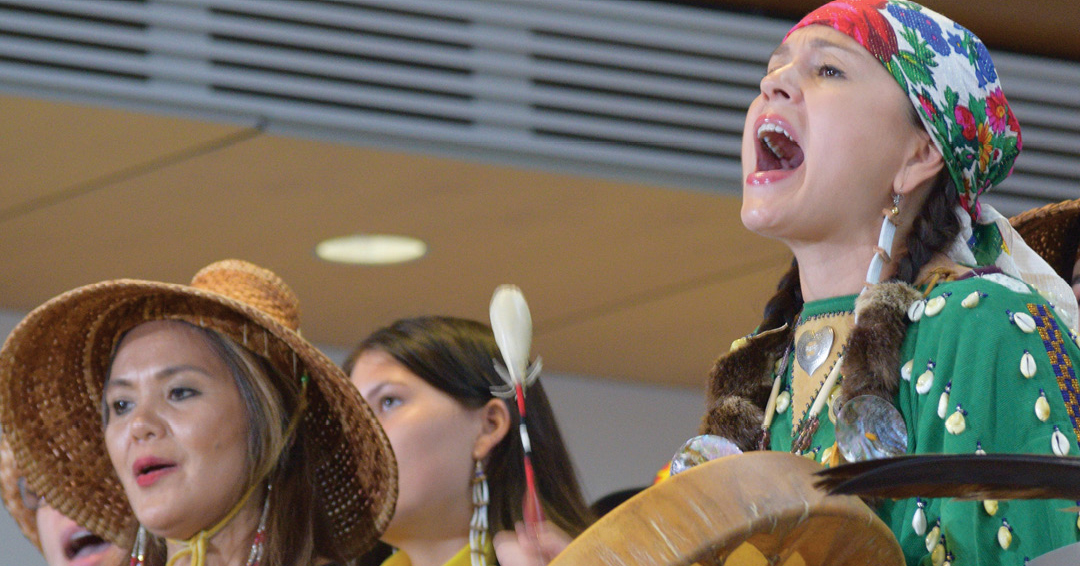
The City of Seattle recognizes that the Indigenous Peoples of the lands that would later become known as the Americas have occupied these lands since time immemorial. Our city is built on the ancestral lands of the Coast Salish people and is named after Chief Si’ahl (also known as Chief Sealth) of the Duwamish and Suquamish tribes. We are committed to honoring the legacy and ongoing contributions of our American Indian and Alaska Native communities, today for Indigenous Peoples’ Day, and every day.
To celebrate Indigenous Peoples’ Day, Seattle is hosting virtual celebrations and highlighting ways to support this community. Seattle Channel is featuring speakers, music, and performances acknowledging the Coast Salish and Duwamish people who first called our region home. Seattle Center is hosting a four-day festival October 12-15 celebrating American Indian and Alaska Native cultures through song, dance, performances, art, food and the sharing of Indigenous knowledge. If you want to support Native-owned businesses, our Office of Economic Development has a guide for everything from fine art to food trucks. Our Department of Neighborhoods is also highlighting Native voices with pieces from Cecile Hansen, Duwamish Tribal Council Chair, Russell Beard, a member of the Duwamish diaspora, and Ken Workman, the fifth-generation great-grandson of Chief Si’ahl.
As we work to build back as a more just and equitable city, Seattle is committed to improving services and supporting our American Indian and Alaska Native communities. That’s why in 2021 we made millions of dollars in targeted investments to help reduce homelessness, improve environmental justice, and increase safety and accessibility for these communities.
American Indian and Alaska Native peoples are disproportionately represented in our unsheltered homeless community, being only one percent of King County residents but 27 percent of the unhoused peoples in 2020. In April 2021 we announced a partnership with the Chief Seattle Club to open the Kings Inn as a shelter focused on the needs of this community and the COVID-19 crisis. Launched with federal funds, this partnership provides 66 rooms and culturally informed services including traditional foods and tribal health services to put people on the path to permanent housing.
The Duwamish Valley has undergone countless changes from tribal lands to some of Seattle’s most diverse communities in the South Park and Georgetown neighborhoods today, including an American Indian population. But decades of heavy industrial use have harmed air and water quality, and caused soil contamination and noise pollution. To address these inequities, Seattle partnered with community stakeholders to create the Duwamish Valley Action Plan in 2018. Building on that initial progress, in September 2021 Mayor Durkan proposed an additional $8.5 million investment to build a more just and prosperous Duwamish Valley for all.
The Duwamish Longhouse and Cultural Center is an important resource to tribal communities, historical researchers, and anyone interested in understanding the rich history of our region. But its location on West Marginal Way SW was impacted by the closure of the West Seattle High-Rise Bridge and detoured traffic. To support our Vision Zero goals and this important community asset, Seattle’s Department of Transportation is building pedestrian, bicycle, and accessibility improvements near the Longhouse including new signals, crosswalk, and sidewalks.
Indigenous Peoples’ Day is an important opportunity to learn about the history of the lands and celebrate the rich culture and traditions of the peoples who occupied them since time immemorial. We will continue to work across governments with the Suquamish, Muckleshoot, and many Tribal governments impacted by our city’s actions. In Seattle, it bears extra weight as we consider the legacy of the Chief our city is named for and recognize the inequities that persist today. Seattle is committed to being a more just, equitable, and welcoming city for the many peoples who call us home.